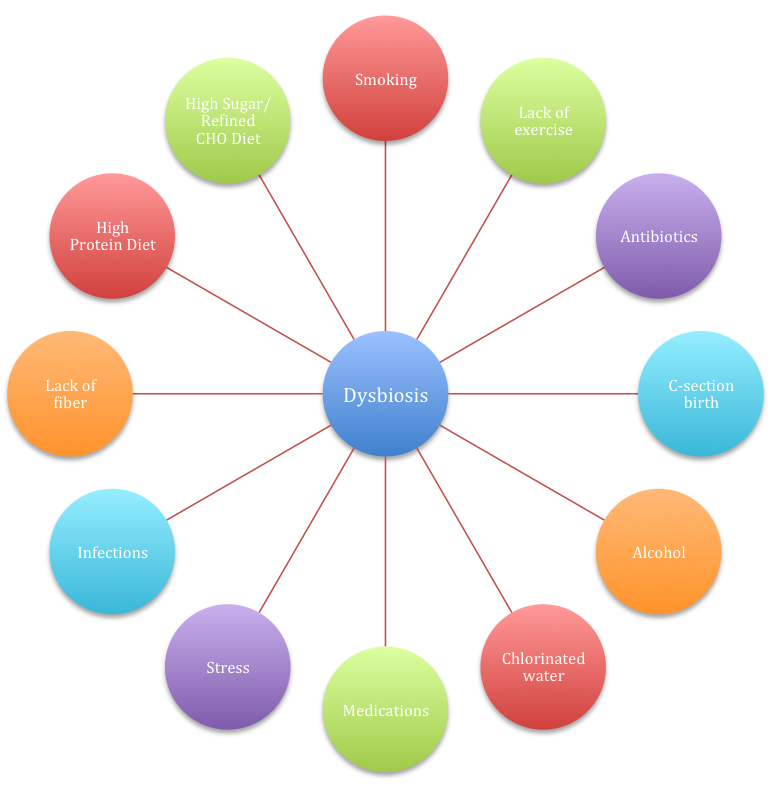Given my passion for the gut, I thought I would do a quick overview to explain its importance. You may have heard about the gut-brain connection or its role in the immune system. Most likely you know someone who has celiac disease, food allergies, or a digestive disorder such as irritable bowel syndrome (IBS). These are all directly related to the gut, but that is only the tip of the iceberg.
The average adult gastrointestinal (GI) tract contains approximately 100 trillion microorganisms weighing in at about 3 pounds. This is a massive ecosystem living within us that plays a major role in our health. The health benefits of the microflora include modulating our immune system, improved digestion and absorption of nutrients, production of vitamins B and K, weight management, and protection from pathogens.
“ALL DISEASE BEGINS IN THE GUT!”
– HIPPOCRATES
The development of our microbiome and our immune system begins with the exposure to a mother’s microflora during birth and/or breastfeeding. After this initial colonization period, the type of foods consumed heavily influences the establishment of the microbiome, which continues to develop for the first 2 to 3 years of life.
Maintaining a diverse and thriving population of good bacteria helps keep the bad bacteria in check. Imagine your gut is a big parking lot. The beneficial (good) bacteria have preferred parking and they will crowd out the harmful (bad) bacteria when they are in abundance. However, if there are a lot of open parking spaces then the pathogenic bacteria will take over and fill up the parking lot. This imbalance is known as dysbiosis.
Dysbiosis can lead to leaky gut, candida (yeast overgrowth), food allergies/sensitivities, and malabsorption. In addition, dysbiosis is also associated with many chronic and degenerative diseases such as irritable bowel syndrome (IBS), small intestinal bacterial overgrowth (SIBO), autoimmune diseases, obesity, diabetes, cardiovascular disease (CVD), atopic eczema, autism, and non-alcoholic fatty liver disease (NAFLD). You can see why your gut health is so important!
What Causes Dysbiosis?
Unfortunately, there are many factors that can contribute to dysbiosis. As you can see in the diagram below, we are exposed to many of these factors on a regular basis and it is nearly impossible to completely avoid all of them.

So, what does this mean? It means that we have to be continuously replenishing and feeding the good bacteria to keep our guts healthy and happy.
Signs & Symptoms of Dysbiosis
I’m sure right now you are asking yourself, how do I know if I have dysbiosis? The first step is reviewing your medical and diet history, antibiotic use, and other risk factors. The best laboratory test available is a stool analysis, but there are also signs and symptoms that can indicate an imbalance.
- Excessive Gas
- Bloating
- Abdominal Pain
- Diarrhea/Constipation
- Decreased Concentration
- Fatigue
- Joint pain
- Food allergies/sensitivities
The Importance of Prebiotics and Probiotics
It’s important for everyone to incorporate foods into their diet that support gut health. I’m sure most of you have heard of probiotics, but prebiotics are equally as important, if not more. Think of probiotics like soldiers that you are sending in for battle. Prebiotics are foods containing non-digestible fiber that feeds the probiotics and grows your army of beneficial flora.
A few examples of good prebiotic foods are plantains, green bananas, jicama, asparagus (raw/slightly cooked), legumes, and Jerusalem artichokes. If you don’t typically consume a lot of prebiotic foods I recommend starting with a small serving. It’s normal to experience a little bit of gas/bloating at first. This should subside as you include them into your diet more regularly. If you experience excessive gas, bloating or abdominal pain this may be a sign of dysbiosis. Try reducing the serving size and slowly increasing it as you can tolerate more.
Probiotics can be found in fermented foods such as sauerkraut, kimchi, kefir, yogurt, and kombucha. I highly encourage incorporating fermented foods into your diet daily. Fermented foods are like a daily vitamin for your gut and will improve your digestion and metabolism of foods, as well as support your immune system. Probiotics can also be taken in supplement form and can be extremely beneficial when treating dysbiosis and other digestive disorders.
If you suspect that you may have dysbiosis or are experiencing digestive issues I recommend working with a functional nutritionist or health practitioner who can help you identify the root cause and restore your gut health.

